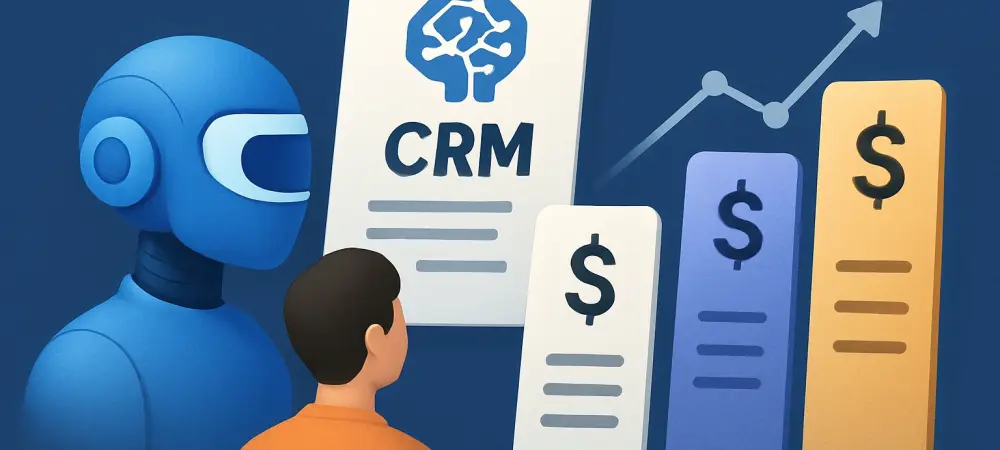Setting the Stage for a Pricing Revolution
The landscape of Customer Relationship Management (CRM) systems is undergoing a seismic shift, propelled by the integration of artificial intelligence (AI). Imagine a scenario where businesses no longer pay for software based on the number of users but instead for the tangible results delivered by intelligent systems working tirelessly behind the scenes to drive success. This transformation is not a distant dream but a pressing reality as AI redefines how value is measured in CRM tools. The shift from static pricing to dynamic, outcome-driven models raises critical questions about cost, efficiency, and scalability for enterprises worldwide. This review delves into the heart of AI-driven CRM pricing, exploring how this technology is reshaping traditional structures and what it means for businesses navigating digital transformation.
Unpacking the Features of AI-Driven CRM Pricing
From Static to Dynamic Models
At the core of AI-driven CRM pricing lies a fundamental departure from the conventional per-seat, per-user framework. Historically, companies paid a fixed rate regardless of the actual value derived from the system. Now, with AI’s ability to automate complex tasks and deliver measurable results, pricing is increasingly tied to outcomes or consumption. This shift reflects a broader recognition that the worth of a CRM system should be based on its impact rather than mere access, paving the way for more equitable cost structures.
Systems of Action Over Systems of Record
CRM platforms are evolving from passive repositories of data, or “systems of record,” into proactive “systems of action.” Powered by AI agents, these systems execute tasks, generate insights, and drive business outcomes without constant human intervention. This capability justifies pricing models that focus on the work performed by AI, such as processing transactions or closing deals, rather than the number of human users. The transition underscores a new era where technology’s active role directly influences cost calculations.
Outcome-Based and Consumption-Driven Frameworks
A defining feature of modern CRM pricing is its alignment with specific results or usage metrics. Similar to e-commerce platforms where vendors earn a percentage of sales, some CRM systems now charge based on transaction volumes or the complexity of tasks handled by AI. For example, businesses can evaluate the cost-effectiveness of AI tools by comparing them to the expenses of hiring traditional sales development representatives. This value-based approach ensures that companies pay for real impact, not just potential.
Performance Analysis of AI-Driven CRM Pricing
Industry Trends and Adoption Rates
The acceptance of AI as a replacement for human agents in certain CRM functions is gaining momentum across industries. By automating repetitive tasks, AI agents offer significant cost savings, allowing businesses to rationalize spending. This trend is accompanied by a growing preference for value-based pricing, where fees correlate with results rather than headcounts. However, the market remains in a hybrid state, with both innovative and traditional models coexisting as companies test the waters of this new paradigm.
Vendor Strategies and Market Dynamics
Major CRM vendors are adapting to this shift with varied approaches. Salesforce, for instance, has introduced a “Flex Credits” system, enabling clients to balance spending between human users and AI capabilities during renewals. HubSpot offers consumption-based plans with affordable rates for core users while allowing flexibility for additional access. Meanwhile, smaller players in the customer success space leverage their agility to introduce disruptive pricing models, challenging larger incumbents who often stick to per-seat structures for revenue stability.
Challenges in Implementation
Despite the promise of AI-driven pricing, unpredictability remains a significant hurdle. Businesses and vendors alike hesitate to fully embrace outcome-based or consumption-driven models due to difficulties in forecasting costs and returns. Many providers continue to rely on traditional frameworks for renewals and expansions to maintain financial predictability. Ongoing efforts to refine these newer models aim to address such concerns, striving for structures that balance innovation with reliability.
Looking Ahead: The Future of AI-Driven CRM Pricing
Long-Term Trajectory and Scalability
As AI technology matures, the adoption of value-based pricing is expected to accelerate over the coming years. From now to 2027, advancements in AI capabilities could further streamline pricing structures, making them more scalable and tailored to diverse business needs. The potential for AI to handle increasingly complex tasks suggests that CRM costs will continue to reflect the depth of automation and intelligence delivered, rather than static metrics.
Societal and Operational Impacts
The broader integration of AI into CRM systems promises substantial societal and industry benefits, including reduced operational costs and enhanced efficiency. Businesses stand to gain from AI agents’ round-the-clock availability and deep knowledge of products and markets. Yet, this shift also raises questions about workforce dynamics and the need for upskilling employees to work alongside intelligent systems, highlighting the dual nature of technological progress.
Final Verdict on AI-Driven CRM Pricing
Reflecting on this exploration, the journey of AI-driven CRM pricing reveals a transformative force that challenges conventional cost models with dynamic, results-oriented approaches. The technology demonstrates immense potential in aligning expenses with actual value delivered, as seen through innovative strategies from leading vendors and emerging disruptors alike. For businesses, the next step involves carefully evaluating these evolving models, weighing the benefits of cost savings and efficiency against the uncertainties of newer frameworks. Moving forward, a prudent approach would be to pilot hybrid pricing structures, blending traditional stability with AI-driven flexibility, while staying attuned to industry advancements. This balanced strategy ensures that enterprises capitalize on AI’s promise without overextending into uncharted financial territory, setting a foundation for sustainable growth in an AI-powered CRM landscape.

